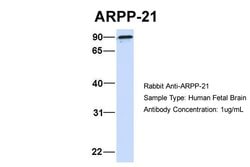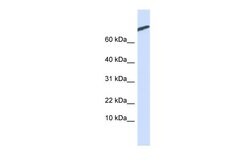Learn More
Invitrogen™ ARPP21 Polyclonal Antibody
Rabbit Polyclonal Antibody
Supplier: Invitrogen™ PA5113748
Description
Immunogen sequence: ESSARPGGES LQDQESIHLQ LSSFSSLQEE DKSRKDDSER EKEKDKNKDK For short term use, store at 2-8°C up to 1 week. For long term storage, store at -20°C in small aliquots to prevent freeze-thaw cycles. Predicted homology: Cow: 100%; Dog: 100%; Guinea Pig: 93%; Horse: 100%; Human: 100%; Mouse: 100%; Pig: 100%; Rabbit: 100%; Rat: 100%; Yeast: 82%.
The autosomal dominant cerebellar ataxias (ADCA) are a heterogeneous group of neurodegenerative disorders characterized by progressive degeneration of the cerebellum, brain stem and spinal cord. Clinically, ADCA has been divided into three groups: ADCA types I-III. ADCAI is genetically heterogeneous, with five genetic loci, designated spinocerebellar ataxia (SCA) 1, 2, 3, 4 and 6, being assigned to five different chromosomes. ADCAII, which always presents with retinal degeneration (SCA7), and ADCAIII often referred to as the pure' cerebellar syndrome (SCA5), are most likely homogeneous disorders. Several SCA genes have been cloned and shown to contain CAG repeats in their coding regions. ADCA is caused by the expansion of the CAG repeats, producing an elongated polyglutamine tract in the corresponding protein. The expanded repeats are variable in size and unstable, usually increasing in size when transmitted to successive generations. The function of the ataxins is not known. This locus has been mapped to chromosome 6, and it has been determined that the diseased allele contains 41-81 CAG repeats, compared to 6-39 in the normal allele, and is associated with spinocerebellar ataxia type 1 (SCA1). At least two transcript variants encoding the same protein have been found for this gene.
Specifications
| ARPP21 | |
| Polyclonal | |
| Unconjugated | |
| ARPP21 | |
| 0710001E13Rik; AI853636; ARPP21; Arpp-21; cAMP regulated phosphoprotein 21; cAMP regulated phosphoprotein 21kDa; cAMP-regulated phosphoprotein (21 kDa); cAMP-regulated phosphoprotein 21; cyclic AMP-regulated phosphoprotein 21; cyclic AMP-regulated phosphoprotein, 21; cyclic AMP-regulated phosphoprotein, 21 kD; D9Bwg1012e; Ppp1r1c; Ppp1r1cl; protein phosphatase 1, regulatory (inhibitory subunit 1C); protein phosphatase 1, regulatory (inhibitory) subunit 1C; protein phosphatase 1, regulatory subunit 1C; R3H domain containing 3; R3HDM3; RCS; Regulator of calmodulin signaling; RGD1307208; RGD1307215; TARPP; thymocyte ARPP; thymocyte cAMP-regulated phosphoprotein | |
| Rabbit | |
| Affinity Chromatography | |
| RUO | |
| 10777 | |
| -20°C, Avoid Freeze/Thaw Cycles | |
| Liquid |
| Western Blot | |
| 0.5 mg/mL | |
| PBS with 2% sucrose and 0.09% sodium azide | |
| Q9UBL0 | |
| ARPP21 | |
| Synthetic peptide directed towards the N terminal region of human ARPP-21 (aa 74-123). | |
| 100 μL | |
| Primary | |
| Human | |
| Antibody | |
| IgG |
Safety and Handling
Your input is important to us. Please complete this form to provide feedback related to the content on this product.

